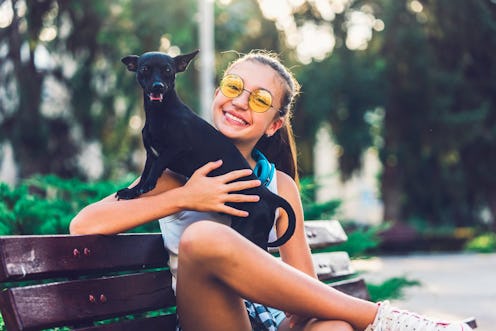
If you're anything like me, the first thing you do when you see a dog is talk to it. I tend to babble incoherently, but there's actually new research out there on the words people say to their dogs the most. The data comes from research out of Barnard College's Dog Recognition Lab, where researchers Alexandra Horowitz and Julie Hecht hope their findings can add to scientific literature on the best ways dogs can be used as service or support animals. Pretty awesome, right?
How do they go about their research? They basically live the dream by getting to watch tons of dog videos. One recent example, which was published in the journal Animal Cognition, involved analyzing 187 videos of people playing with their dogs. The (human) subjects in these videos were from 19 different countries and ranged in age from 8 to 75 years old. While the researchers were looking at the pitch in which people spoke to their dogs and the way they played with one another, they also compiled a list of the words owners frequently say when speaking to their dog. The list has 35 words or phrases in total, but interestingly, many of them seemed to be sort of categorically related. Or at least, that's what I got from the results.
Here are some of the most common words and the categories I think they fall in; you can check out the full list of words people say to their dogs the most here.
1. Commands
If you've ever played with a dog, it's no surprise that commands are pretty popular. Words like "give," "go," "get," and "drop" are among the most common researchers picked up. Interestingly, if you want to teach a dog a new command, it's important not to repeat yourself when they don't obey right away. If you repeat yourself, you run the risk of your dog learning to obey only after you've said it for the third or fourth time. They key is to say it once, then walk away, return, and try it again, so your dog learns you'll only give the command once.
2. Questions
Words frequently associated with asking questions appear on the list, including things like "where is," "whatcha," and "wanna." If you play with dogs, you're probably familiar with the way dogs are quick to hide toys or bones as a way of "playing back" with you, so you've probably asked your dog where they put their bone even when it's right behind them... or when it's buried in the bottom of your couch.
3. Praise
Pretty much everyone loves receiving praise, and dogs are no exception. In fact, it's an integral part of training and bonding for an owner and dog. Words and phrases like, "good," "yeah," "yes," and "OK" commonly appear which makes sense; not only are these words positive affirmations, but they're also simple and easy to understand. Dogs generally do better with short sentences and short words.
4. Names
Unsurprisingly, dogs' names topped the charts on how frequently they appeared in the study. Generally, dogs come to associate their names with positive things. So when dogs hears their name, it's likely they associate it with getting treats, going for a walk, etc. You know how sometimes you call a dog and they come, but your others don't? This is where the name thing gets really interesting: It's not necessarily that the other dogs are like, "Oh, my name is Mike, not Billy, so my owner isn't talking to me," but more so that they haven't identified Billy's name as meaning something positive (because they don't get a treat when you only call over Mike). So, they don't "answer" to it. Cool, right?
5. Objects
If you've ever played with a dog before, you probably know just how much they love their toys — which is why it's no surprise that words like "ball," "that," and "it" frequently appear in the videos. Dogs associate play with having fun and bonding with you (and each other), so they learn certain words in context of their fun. That's why your dog may come to recognize "ball," but likely wouldn't recognize a more specific word like "basketball" — instead, your dog is likely to answer to you calling it "ball," or even something simpler, like "it."
So, there you have it! I think it's awesome that research is being done to better develop resources and skills for support and service dogs. If you're a dog lover in general, it's always cool to sit back and think about how you're communicating with your dog and what the best strategies are for developing your bond with your furry pal.
Images: mikimad/E+/Getty Images; Giphy (3)